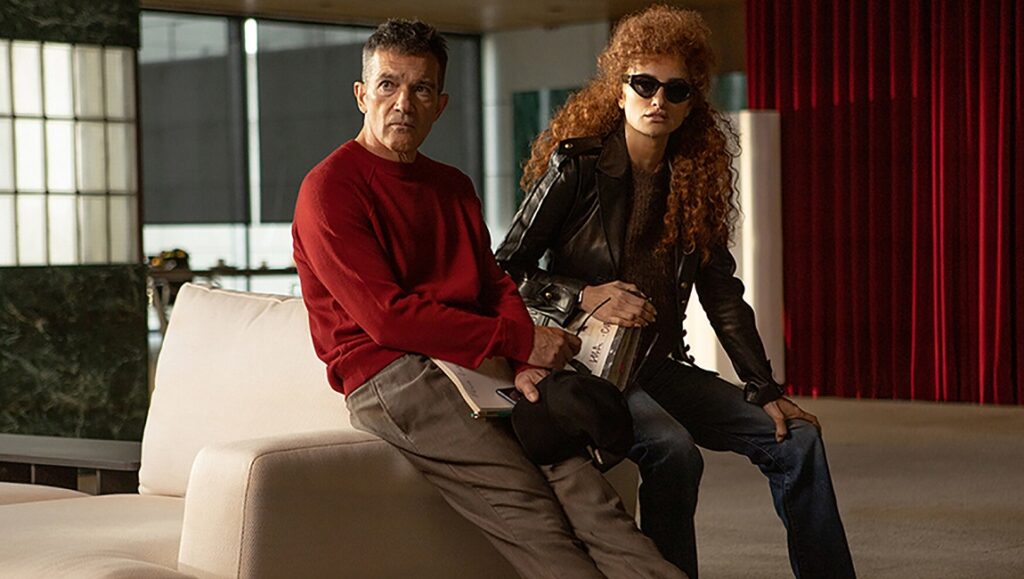Official Competition is a decidedly strange film — formally impressive, off-kilter in its humor, and often incisive with its observations of the state of cinema.
If nothing else, Gastón Duprat and Mariano Cohn’s latest comedy Official Competition is a filmic treatise on ego. How do we define our own worth? How does the surrounding world define our worth? And how does that world define the worth of what we produce? Successful multimillionaire Humberto Suárez (José Luis Gómez) mulls this question as he peers out of his corner office window. He’s concerned with redefining how he will be remembered, and he has cash he can part with. Naturally, he decides to make financing a capital-G great film his legacy play. His team recruits the prestigious and eccentric director Lola Cuevas (Penélope Cruz) to direct an adaptation of a Nobel Prize-winning novel about competing brothers. She enlists the talents of two acting titans, Félix Rivero (Antonio Banderas) and Iván Torres (Oscar Martínez) to bring her vision to life. All these artists have rather pronounced egos of their own, so their rehearsals quickly devolve into bouts of comical one-upsmanship. Official Competition is a serious-minded satire that works best when it’s not taken that seriously, a borderline absurdist send-up of the filmmaking business and the sorts of people who participate within and predominate over it.
Clear as day from the get-go is the Cain and Abel dimension to this tale. Iván and Félix, both cast against type, effectively have anti-chemistry, an affinity born out of their mutual disdain for one another. Iván is the insufferable intellectual and artistic purist who despises first-class flights, foolish audiences, and really any marker of privilege or comfort whatsoever. Félix is a past-his-prime international megastar so obsessed with appearances his face is contractually protected. Put another way, they’re caricatures of the real-life figures who portray them. As in other Duprat-Cohn projects, opposing forces clash in order to bear out some truth. What similarities can be conceded? What differences remain irreconcilable? As men, the two share a stubborn commitment to their beliefs and a hypermasculine drive to ensure their take on things is the one that wins out. Leave it to Lola — an off-the-wall auteur in a complicated relationship with the aestheticization of suffering — to put both men in their place scene after scene after scene. Her manipulations are a source of a lot of Official Competition’s humor, with a notable scene being Lola intimately demonstrating that women can give other women what men simply cannot.
You can sense that these characters are subordinate to the expectations of the genre: they exist to embody worldviews, to give shape to ideas rather than exist purely as people. And remember, this is a Cain and Abel story. One perspective on the proper approach to acting, on the intelligence and desires of mass-market audiences, on the ultimate purpose of the art form itself will triumph in the end. The typical line is that these days the state of cinema is at a crossroads, but in truth we’ve already gone way down a particular road. Martin Scorsese’s trepidations about the continuing commercial marginalization of movies that actually make you confront things has echoes of Pauline Kael’s own worries about conglomerates controlling Hollywood studios over forty years ago. It feels more and more like we’re approaching some endgame, and it feels like Official Competition knows this. The characters waxing philosophically about truth and about art do so aggressively because they know they are on the defense. It’s not all spelled out clearly or cleanly; often, especially in the film’s middle section, The DiscourseTM is invoked to signal the film’s awareness of the current moment rather than to comment on it. Yet the finale’s poignantly dejected mood indicates that, while the story isn’t finished, we are fast approaching a moment where the role of movies may be irrevocably set.
But this being a comedy, the big question is if this all is funny or not. It is, but it may not be to everyone’s taste. Strap in for a steady stream of gags, a few visual if you pay close attention, some more predictable than others. The dryness of the humor is so consistent that the film as a whole can be tonally described as droll. Whether its peculiarly off-kilter vibe and deliberate pacing will come off as plodding depends on the appetite of the viewer. Most of the film’s action takes place in different spaces across one general location, beautifully introduced in an establishing shot about ten minutes in. The use of wide shots often highlights how puny these self-important characters are compared to the rest of life around them. Many scenes utilize negative space and silence to great effect; Duprat and Cohn have an eye for visual composition that makes attuning yourself to Official Competition’s formal aspects a treat. That’s not to say you should enter in expecting a rip-roaring time, but watching some greats give this strange material their all makes this film worth the while nonetheless.


Comments are closed.